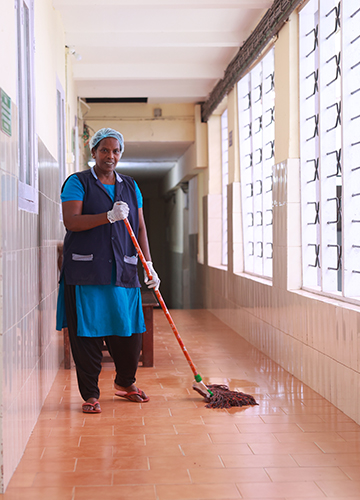In the 40 minutes I speak with her, Kunjumol’s smile never falters, until I think to myself that it might be the most dependable part of her, the one thing I can count on. Sometimes, she laughs shyly and then looks at me. Usually, the joke is a self-deprecating one, and she is looking either for validation or to see whether I was offended. Which, in truth, is the real joke. After all, she is the one doing me a favour. She is the one who has given up her lunch break to speak with me.
The real miracle, however, is that smile. Even when she talks of the most tragic events of her life, the smile remains in place. Some might say that life has pressed her hard enough to squeeze out the smile. Two years ago, she lost her husband to liver disease. She had taken a loan to get him treated, and is now in considerable debt. Both her daughters are unmarried and her son is in class 12. In the three cents of land that she owns, she has not been able to build a house. She earns Rs9,000 a month as a cleaner at a mid-level hospital in Kerala, which is hardly enough to make ends meet. She gets some financial help from her elder daughter, who works at a nearby hospital as a receptionist. “I had got an offer from the same hospital, but my daughter asked me not to take it up,” says Kunjumol, 50. “She said it pained her to see her mother as a cleaner in the same place that she works.”
Kunjumol wakes up at 5am every morning and prepares her children’s meals. Once she sends them off, she gets ready for her shift from 9am to 5pm. In the hospital where she works, she will be assigned different wards every day. She sweeps and mops, takes out the waste, and cleans the bathrooms—around 17 a day. Her home is quite far from the hospital, and she reaches back by dusk, after which she does the remaining housework—washing and ironing clothes, sweeping the courtyard and cooking. If she has time, she will watch children’s talent shows and music contests on television. She ends her day with a prayer. “I don’t pray for wealth or privilege,” she says. “I only pray for the health to be able to do my work.”
She does not watch movies; somehow, she lost interest in them after her husband’s death. Even as a family, they stopped going to cinema theatres. “My children don’t insist that I take them,” she says. “They understand our financial constraints, and how I am struggling to educate them.”
In fact, her three children are her greatest hope and treasure. “My husband, while he was alive, was insistent that they be taught in English medium schools,” she says. “After he died, I used to drill into them how important it was to get an education. We don’t have anyone to depend on but ourselves, I used to tell them. Only an education can help you become independent. Those times, they would jokingly ask me, ‘If you knew all this, then why didn’t you study beyond 10th standard?’ I would tell them it was because there was no one to push me the way I was pushing them.”
Her father was a farmhand and from a young age, she used to go out to the fields to help with the cultivation. During the harvest, she would skip school altogether. After her 10th standard exams, she never went back to school. “There was no one to force me to study further,” she says. “If only someone had forced me, I might have completed my education. Then I might have gotten a better job.”
She does not say this with bitterness or anger, but rather, with acceptance. In fact, she likes her job as a cleaner. She has made her work her calling. “Whatever I do, I do it with my whole heart,” she says. “My superiors always say that once you send me into a room, you can be sure it will be spotless by the time I am done.” The secret, she says, is never to compare. She, for example, has never once in her life compared herself with someone wealthier, more fortunate or with a better job than her. “Sometimes my children compare,” she says. “I lived in a two-storied house in my childhood. All my siblings have homes of their own. Occasionally, my children ask me why we don’t have our own home. That time, I tell them that a home is not our priority currently. What is important is ensuring a secure future for them. I tell them jokingly that I will ensure that they get married into families with homes of their own.”
She also makes it a point never to worry about the future. “Who can say where I will be in 10 years?” she asks. “Or whether I would even be alive? What good does worrying do? Sometimes, in a lighter vein, I tell my children that if they can’t take care of me in my old age, they should choose a good old-age home.” She laughs at that and looks at me. Laughter for her, I understand, is often a defence mechanism. She wants me to understand that she does not take her problems too seriously, so why should I? Perhaps she has not found the meaning of life—which is best left to philosophers and saints—but she has found meaning in life. It lies in treating it with a light touch. It lies in facing it with a smile. That smile has become part of her identity. She waves it like the banner of a general who has tasted victory in war.


